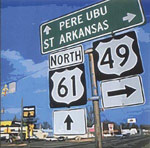Dreamland: New Places To Go
| |

| Sunshine has curtailed my listening for a while: better to get out in the garden than sit inside listening to the mournful tones of Ingram Marshall, though I was quite happy to do so [and shall be again] whilst it was rainy and cold. I know little about Marshall, although the CD Ikon and other Early Works [New World Records] shows him exploring both tape loop echo & decay, and more electronic areas of music. But they don't really hold my attention, just show where this composer started from. Better still to move on to works such as 'Fog Tropes' and 'Gradual Requiem', 'Dark Waters' and 'Evensongs', from various CDs on New Albion Records. Here, slow, tonal blocks of sound drift and collide against each other, conjuring - sorry to be so cliché - calm twilights and still waters, holiday evenings half-remembered. But the music is tougher than this might suggest, and if you are in to minimal small-/ever- changing music, often containing field recordings from the world about us, more concerned with attention to detail than big dynamics and noise, you'll enjoy this composer's work. His latest CD, Kingdom Come [Nonesuch], seems to me to show a moving on. On the title track, Marshall combines a Croation choir with orchestra in a moving & fluid piece inspired by [or 'about' as much as these things can be 'about' anything] ethnic wars. In 'Hymnodic Delays' Marshall has been reworking historical New England songs, using electronic treatments to stunning effect. The CD finishes with 'Fog Tropes II' a mournful hooting piece of music, both an updating and a response to the original 'Fog Tropes'. More suited to the sunshine perhaps, is Jah Wobble's The Early Years [Hertz Records], which I picked up in a sale. Subtitled 'early singles and the bedroom album' I thought I'd made a mistake until I hit the album part, where Wobble's bass suddenly comes alive and the small group actually seem to be feeding off and nurturing one another in their playful dub experiments. I wanted to like the earlier 12-inches collected here a lot more than I did, as the differing line ups - often including jazz players - looked exciting and offered the possibility of tension and dynamics. But all too often they turn out to be leaden plods through arid dub landscapes. Other places to visit include Sonic Youth's Murray Street [Geffen], a tuneful rocky set of songs made interesting due to quirky interventions and production by new band member Jim O'Rourke. Sonic Youth will, I suspect, never again produce masterpieces like Confusion is Sex or Bad Moon Rising, but if we can put that aside these are intriguing songs from the dusty corners of New York, a New York also inhabited by Luna. On their new CD, Romantica [Jetset], they continue to explore territory mapped out by the Velvet Underground many years ago, making a music initially monotonous and similar from track to track. But careful and continued listening reveals the intricate and careful melodies, tunes and tones hidden in this work. This is drone and dirt made shimmering and light, a seductive and astonishing record. |

| Out on the edges of the map Pere Ubu are still heading out from EREWHON to St Arkansas [Glitterhouse], still ranting & shouting, still producing music that slithers and slides all over the place whilst analogue synths squeal and blurt behind front man Dave Thomas' excited vocals. Honesty confesses me to say I've found most of Pere Ubu's albums in the last decade very similar and unmemorable - they too, like Sonic Youth, have a past they will never recapture or aspire to again - but this is good stuff, if more of the same:, although it is a place we've been to before. Robert Plant makes no bones about having been before. On Dreamland [Mercury] he offers the listener 11 versions of songs he grew up with and has now made his own. Many were featured on his Priory of Brion tour, but here he has assembled a new band - including Jah Wobble guitarist Justin Adams - to make this music new. Much is blues-based, but elsewhere he re-invigorates 'Hey Joe', explores the Youngblood's classic 'Darkness, Darkness' and manages to bring something new to Tim Buckley's astonishing 'Song to the Siren'. This is music for a lazy summer evening, a justified piece of revisitation that manages to skirt nostalgia. I'm not so sure that David Bowie knows exactly where he is though! Heathen [ISO/Columbia] is being hailed by other reviewers as a 'return to form' [what, again?] and a classic album; for me it's his fourth album in a row that I like but that still doesn't come close to Heroes, Low or Station to Station. These songs are dark, menacing, literate and clever, with some musical and lyrical surprises, all beautifully arranged and played. But there's something slightly cold about them all, there's no 'edge' or sense of exploration. Which is something I also think Craig Armstrong struggles with on As If To Nothing [Melankolic] where his own tracks seem merely synthetic doodles in comparison to his astonishing versions of other people's music . Best are the stripped-back tearjerker version of U2's 'Stay [Faraway, So Close!]' which manages to be both pompous and raw at the same time [Bono sings for all he's worth here] and Armstrong's 'Starless II', a reinvention of a King Crimson tune. Built around a guitar sample, Armstrong lets an orchestra riff and soar, both revisiting and re-inventing the original. It's a wonderful piece of music, and shows how both deconstruction and nostalgia can be places where we might want to go. © Rupert Loydell 2002 2002 |